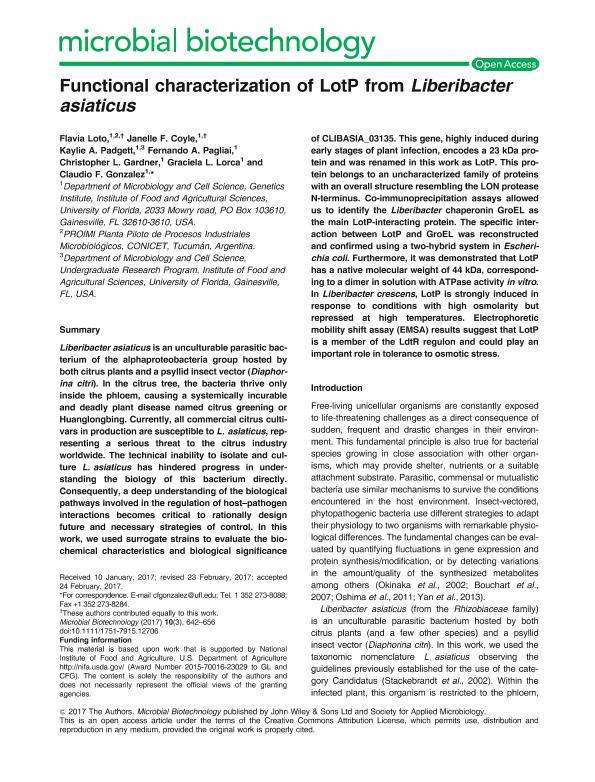Artículo
Functional characterization of LotP from Liberibacter asiaticus
Loto, Flavia del Valle ; Coyle, Janelle F.; Padgett, Kaylie A.; Pagliai, Fernando A.; Gardner, Christopher L.; Lorca, Graciela L.; Gonzalez, Claudio F.
; Coyle, Janelle F.; Padgett, Kaylie A.; Pagliai, Fernando A.; Gardner, Christopher L.; Lorca, Graciela L.; Gonzalez, Claudio F.
 ; Coyle, Janelle F.; Padgett, Kaylie A.; Pagliai, Fernando A.; Gardner, Christopher L.; Lorca, Graciela L.; Gonzalez, Claudio F.
; Coyle, Janelle F.; Padgett, Kaylie A.; Pagliai, Fernando A.; Gardner, Christopher L.; Lorca, Graciela L.; Gonzalez, Claudio F.
Fecha de publicación:
05/2017
Editorial:
John Wiley and Sons Ltd
Revista:
Microbial Biotechnology
ISSN:
1751-7915
Idioma:
Inglés
Tipo de recurso:
Artículo publicado
Clasificación temática:
Resumen
Liberibacter asiaticus is an unculturable parasitic bacterium of the alphaproteobacteria group hosted by both citrus plants and a psyllid insect vector (Diaphorina citri). In the citrus tree, the bacteria thrive only inside the phloem, causing a systemically incurable and deadly plant disease named citrus greening or Huanglongbing. Currently, all commercial citrus cultivars in production are susceptible to L. asiaticus, representing a serious threat to the citrus industry worldwide. The technical inability to isolate and culture L. asiaticus has hindered progress in understanding the biology of this bacterium directly. Consequently, a deep understanding of the biological pathways involved in the regulation of host–pathogen interactions becomes critical to rationally design future and necessary strategies of control. In this work, we used surrogate strains to evaluate the biochemical characteristics and biological significance of CLIBASIA_03135. This gene, highly induced during early stages of plant infection, encodes a 23 kDa protein and was renamed in this work as LotP. This protein belongs to an uncharacterized family of proteins with an overall structure resembling the LON protease N-terminus. Co-immunoprecipitation assays allowed us to identify the Liberibacter chaperonin GroEL as the main LotP-interacting protein. The specific interaction between LotP and GroEL was reconstructed and confirmed using a two-hybrid system in Escherichia coli. Furthermore, it was demonstrated that LotP has a native molecular weight of 44 kDa, corresponding to a dimer in solution with ATPase activity in vitro. In Liberibacter crescens, LotP is strongly induced in response to conditions with high osmolarity but repressed at high temperatures. Electrophoretic mobility shift assay (EMSA) results suggest that LotP is a member of the LdtR regulon and could play an important role in tolerance to osmotic stress.
Palabras clave:
Liberibacter Crescens
,
Huanglobing
,
Enzimes
,
Lotp
Archivos asociados
Licencia
Identificadores
Colecciones
Articulos(PROIMI)
Articulos de PLANTA PILOTO DE PROC.IND.MICROBIOLOGICOS (I)
Articulos de PLANTA PILOTO DE PROC.IND.MICROBIOLOGICOS (I)
Citación
Loto, Flavia del Valle; Coyle, Janelle F.; Padgett, Kaylie A.; Pagliai, Fernando A.; Gardner, Christopher L.; et al.; Functional characterization of LotP from Liberibacter asiaticus; John Wiley and Sons Ltd; Microbial Biotechnology; 10; 3; 5-2017; 642-656
Compartir
Altmétricas



